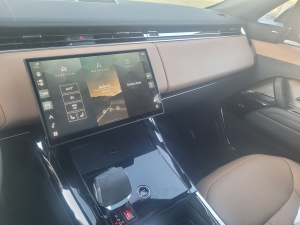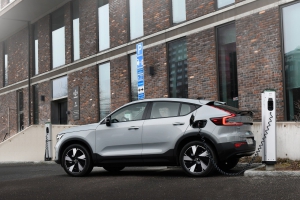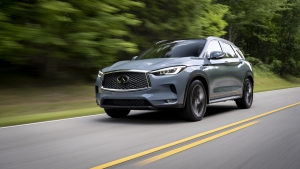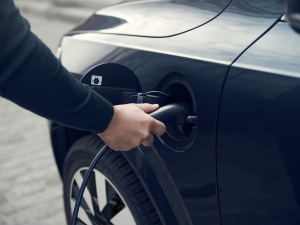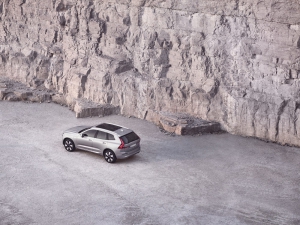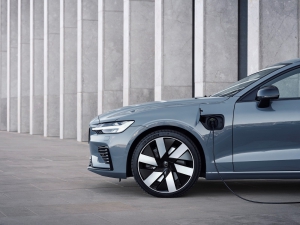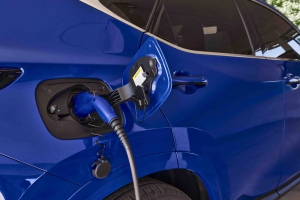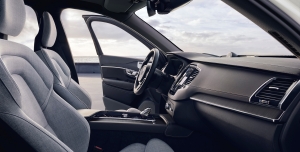2025 Range Rover Sport plug-in hybrid offers classy design, improved fuel economy
If you like the styling of the classy Range Rover, but don't want to pay the extravagant prices required for the full-size model, the two-row Range Rover Sport is aimed squarely at you.
With a plug-in hybrid (PHEV) version available, which extends range and will help limit time at the gas station, the Range Rover Sport aims to court those seeking not just an upscale SUV, but one with green credentials.
I recently spent some time behind the wheel of a 2025 Range Rover Sport PHEV, which battles an increasing number of luxurious vehicles (from the likes of Porsche, BMW, Lexus, Volvo, Mercedes-Benz and Audi) entering the space of plug-in power, and I’m back with a full report.
2024 Volvo C40: An impressive upscale, compact EV crossover option
Volvo is taking the EV transition very seriously, helping to lead the transition to EVs in the luxury market.
They’re not alone of course — with everyone from Porsche to Audi to Genesis to BMW to Mercedes-Benz also diving head first into electrification. And that doesn’t even include the many EV options from non-luxury brands such as Tesla, Hyundai, Kia, Ford and more.
I recently spent some time in a 2024 Volvo C40, a compact and upscale SUV battling in this growing EV Thunderdome, and I’m back with a full report.
The stylish C40 packs quite a punch into a small package, and will surprise a lot of people with what it can do. (Note: To align with new brand naming schemes, the Volvo C40 will be renamed as the Volvo EC40 for the 2025 model year and beyond)
2024 Infiniti QX50 is a roomy, affordable compact luxury SUV
The luxury car world is one with a wide variety of competitors – some dealing in high volumes in the U.S. and others on the lower end.
One of the brands that doesn’t have a huge market share but still offers some compelling vehicles is Infiniti, the luxury division of Nissan that has been offered in the U.S. for more than 30 years.
On the smaller end of their SUV lineup, Infiniti offers a couple vehicles — the QX50 and the QX55 (QX50 being a more traditional compact SUV, and QX55 featuring a more sporty and coupe-style design). Part of their appeal is their pricing starts at less than some of their major luxury competitors — making them appealing to buyers with a budget.
I recently tested a 2024 Infiniti QX50, and I’m back with a full report on how it compares in today’s luxury car market.
2024 Volvo XC90 Recharge offers style, power, plug-in fuel efficiency
The debate over whether fully electric vehicles are the best answer for most car buyers, or if hybrids and plug-in hybrids better fit our lifestyles, rages on.
Volvo has covered all angles with its largest SUV offerings. For those ready to make the leap, they have just unveiled the brand new EX90, a cutting-edge, fully electric, three-row SUV that is starting to make waves.
But they also recognize that not everyone is ready for that big of a leap, and still offer their XC90 three-row offering in a plug-in hybrid option, called the XC90 Recharge.
I recently tested a 2024 XC90 Recharge, which fills an important role in the Volvo lineup and is a great middle ground for buyers who aren’t on board the full-EV train yet.
Read on for full details on how the XC90 Recharge measures up to rival luxury SUVs from Genesis, Audi, BMW, Mercedes and others.
2023 Volvo V60 Cross Country helps carry the torch for luxury wagons
Wagons are pretty much an endangered species in this SUV-focused world, but they’re not dead yet. And Volvo is one of the main reasons for this.
With decades of wagon experience, the Swedish luxury brand continues to make options available to wagon lovers, including its V60 and V90 offerings.
Both of those vehicles also come in Cross Country options, and I recently spent some time behind the wheel of a 2023 Volvo V60 Cross Country, which lives up to the brand’s lofty wagon reputation.
The Cross Country is a version of the V60 featuring a higher ride height, improved suspension and protective body materials.
Volvo has few true competitors in the luxury wagon segment — mainly just the Audi A4 and A6 Allroad, and the Mercedes-Benz E-Class wagon. Read on for a full breakdown of how the V60 Cross Country holds up in this limited but important segment for buyers seeking alternatives to the barrage of SUVs we see in the market today that offer similar versatility, but a better driving experience.
2023 Volvo XC60 Recharge offers luxury, power and green credentials
As automotive brands make their transitions into offering exclusively EVs, a transition that will take many years, the role of plug-in hybrids will continue to be important for many automakers.
Volvo’s current plug-in hybrid offerings include the 2023 XC60 Recharge, a mid-size SUV that delivers in design, performance and safety, and competes well against other plug-in hybrid offerings from brands such as Lincoln, Lexus and Porsche.
This Swedish beauty may have an argument for best in class, and offers both increased power and increased range for 2023.
Read on for a full breakdown of what the XC60 Recharge has to offer to buyers looking for a ride that is both green and enjoyable.
2023 Volvo S60 Recharge: A classy, tech-savvy luxury plug-in hybrid
In the realm of luxury cars, there is a wide variety of SUVs available as plug-in hybrids. But when you turn to the sedan side of things, the numbers are pretty thin.
One company that remains committed to this type of model, which bridges the gap between gas-only rides and full EVs, is Volvo, which offers multiple plug-in hybrid sedan options.
I recently tested the 2023 Volvo S60 Recharge, a stylish entry-level luxury sedan that oozes class and is packed with technology and safety features.
2022 Lexus NX plug-in hybrid brings strong styling, new tech, fuel economy
Lexus is a luxury brand that has long been a supporter of hybrid vehicles, and it recently unveiled its first fully electric vehicle, the RZ 450e.
In the middle of that spectrum of differently powered vehicles is the plug-in hybrid, which embraces a partial EV operation combined with a hybrid setup. Lexus is also pursuing this category, with their first-ever offering being the 2022 Lexus NX 450h+, a plug-in hybrid version of their popular compact SUV.
The 450h+ is part of the second generation of the NX line, which also includes ICE and standard hybrid versions. Plug-in hybrids can help ease worries about range anxiety among buyers, while also allowing them to begin their journey toward fully embracing a true EV.
The luxury battlefield is always intense, and that applies to the electrified/hybrid realm too. So Lexus knows it has to come strong to compete in this sector — where it’s battling brands like Audi, Volvo, Mercedes-Benz and more.
I recently spent time in a 2022 NX 450h+ F Sport, and I’m back with a full report on the vehicle, which shares some technology with the nonluxury Toyota RAV4 Prime plug-in hybrid.
2022 Volvo C40 Recharge offers peppy all-electric drive, looks and feels like the future
Electric cars are no longer the vehicles of the future. They are the vehicles of today, with seemingly every new vehicle announcement focusing on a new EV.
Volvo is one brand leading the charge in the EV landscape, having announced publicly a goal of selling only electric vehicles by the year 2030.
Volvo’s portfolio today includes the all-electric C40 Recharge – a compact crossover model that takes on competitors such as Ford’s Mustang Mach-E, Volkswagen’s ID.4, Audi’s Q4 e-tron, Mercedes-Benz EQA, and Tesla’s Model Y.
The C40 Recharge competes in a segment that focuses on offering extended range and luxury-light styling. Read on for a full breakdown of how it measures up.
2021 Volvo XC90 Recharge is a spacious, eco-friendly luxury SUV
For people seeking a three-row luxury vehicle, but who also want some eco-friendly options, the number of choices is limited but growing. One of the luxury brands that has been a leader in terms of green SUVs has been Volvo, whose offerings include the 2021 XC90 Recharge plug-in hybrid.
Going up against competitors from Audi, BMW, Mercedes-Benz, LIncoln and more is a tall task, but Volvo holds its own.
I recently spent some time in a 2021 XC90 Recharge, and below is a full report on my experience.
News Categories
Popular Tags
Search Reviews by Make

AutoTechReviews is your home for In-depth reviews of the latest cars, trucks, and SUVs; information on all the emerging vehicle technology; and breaking news from the world of NASCAR and other motorsports.
